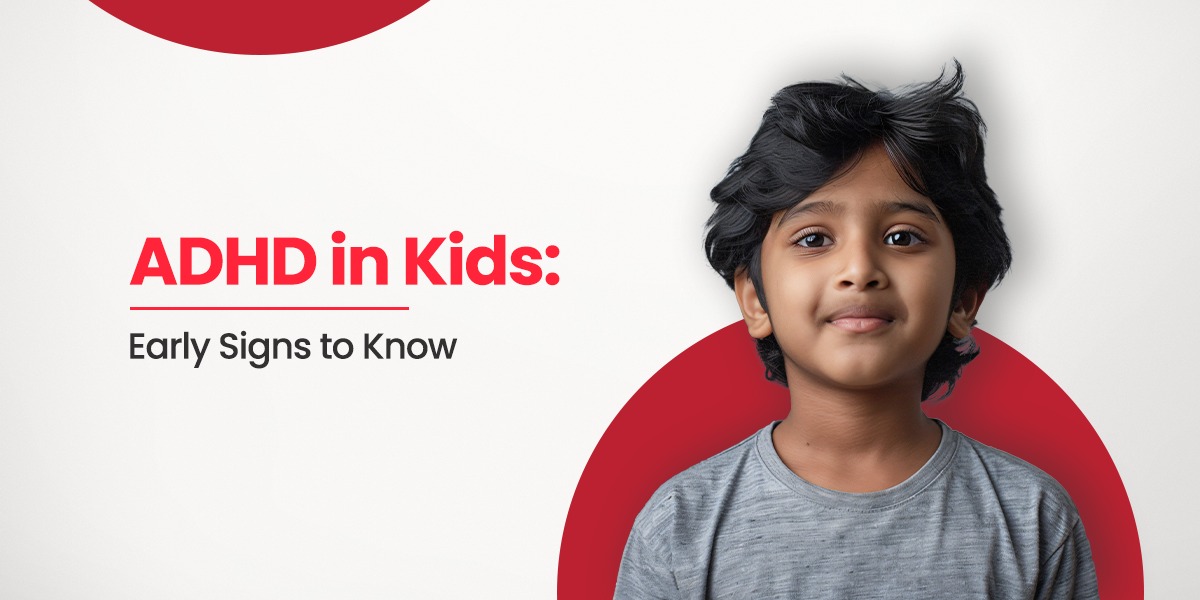ADHD in Kids: Early Signs Parents Shouldn’t Ignore

Every child has their moments, right? One day they’re bouncing off the walls, the next they’re lying on the floor refusing to do homework. That’s just being a kid—or at least that’s what we tell ourselves.
But sometimes, those behaviors aren’t just part of growing up. Sometimes, they’re a sign of something more. If your child struggles to focus, can’t sit still, talks over everyone, or seems to be in their own world more often than not, it might be time to take a closer look.
It could be ADHD in children, and spotting it early can make a big difference.
What Is ADHD?
ADHD stands for Attention-Deficit/Hyperactivity Disorder. It’s not just about being “hyper” or not listening. It’s a real medical condition that affects how a child thinks, learns, and behaves.
Some kids mostly struggle with attention—they get distracted easily, forget things, or can’t stay on task. Others are more impulsive and full of energy. Many have a mix of both.
It’s more common than people think. And no, it’s not caused by bad parenting, too much sugar, or too much screen time.
Signs You Shouldn’t Ignore
It’s hard to know when a child’s conduct is normal and when they need assistance. Most kids forget things or act up every now and again, after all. But if these things happen frequently and make your regular life worse, you should pay attention.
Here are some things to check for if you think you could have ADHD:
- Having trouble sitting motionless, even for a short time
- Always misplacing stuff like toys, pencils, or assignments
- Not paying attention or zoning out while someone talks to you. Doing actions without thinking, rushing away, grabbing items, or interrupting others.
- Getting upset or angry about little things easy
- Having trouble staying on target or following directions
- A lot of talking, frequently at the wrong moment
These indicators sometimes show up in more than one area, such as at home and school. They last for months, not just a terrible week.
If you’re nodding along to a few of these, it’s okay. You’re not alone.
What To Do If You Suspect ADHD?
The first step is to talk to your child’s doctor. A good pediatrician will take your concerns seriously and guide you through what comes next.
If you’re in India, you might want to start with the best pediatrician in Lucknow—someone experienced in spotting early signs and offering real advice, not just quick fixes.
They may ask you and your child’s teacher to fill out some forms. They’ll want to know what your child’s behavior is like at home and school. Sometimes they’ll run tests to rule out other things, like hearing problems or anxiety.
ADHD doesn’t show up on a blood test or scan. It’s diagnosed through patterns of behavior. So your input is super important.
ADHD Symptoms and Treatment: What Helps?
There’s no one-size-fits-all answer, but many kids do really well once they get the right kind of help.
ADHD symptoms and treatment usually include a mix of:
- Behavior Therapy: Helps kids learn how to manage emotions, follow rules, and stay on task
- Parent Training: Teaches you simple tools to handle challenges at home
- School Support: Things like extra time on tests or a quiet place to work
- Medication: Sometimes doctors suggest this, but only if it’s needed
And no, taking medicine doesn’t mean your child will lose their spark. It’s about helping them focus and feel less overwhelmed.
What Does ADHD Therapy Look Like?
ADHD therapy isn’t scary or boring. It’s not just talking—it’s doing. Kids learn how to manage their impulses, stick to routines, and solve problems in a calm way.
It also helps with confidence. Many kids with ADHD feel like they’re “bad” or always in trouble. Therapy can help change that.
Some therapists work with parents, too. Because let’s be real, raising a child with ADHD is no easy job. Support for you matters just as much.
What If You Ignore It?
Sometimes parents hope things will just “settle down” on their own. And sometimes they do. But if ADHD goes untreated, it can make life harder for your child and your whole family.
They might fall behind in school, struggle to make friends, or start feeling down about themselves. Over time, it can lead to anxiety, anger issues, or low self-esteem.
The sooner you get help, the easier it is to turn things around.
Conclusion
Kids with ADHD aren’t lazy, spoiled, or broken. They’re bright, creative, full of potential—they just need the right kind of support. So if your child’s behavior is raising questions in your mind, don’t wait. Talk to a pediatrician. Ask questions. Learn what steps to take.
And remember: getting help isn’t giving up. It’s showing up for your child, your family, and yourself. Because every child deserves to be understood, and every parent deserves answers.
Also Read: Down Syndrome in Children: Causes, Symptoms & Early Support

 Call-an-Ambulance
Call-an-Ambulance



